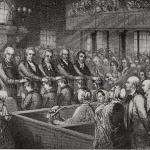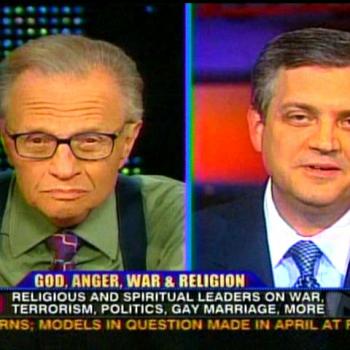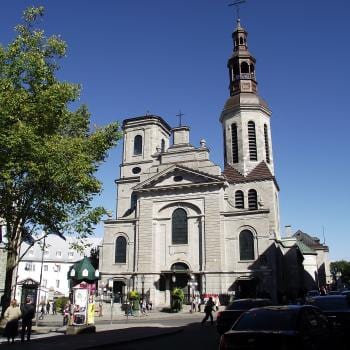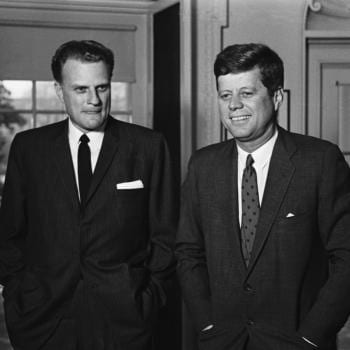Many Protestants until around 1975 thought so. Lyman Beecher, the father of Harriet Beecher Stowe who wrote Uncle Tom’s Cabin, for instance wrote in 1834 about the problem of assimilating Roman Catholics to America’s republican (and Protestant) ethos:
If they could read the Bible, and might and did, their darkened intellect would brighten, and their bowed down mind would rise. If they dared to think for themselves, the contrast of protestant independence with their thralldom, would awaken the desire of equal privileges, and put an end to an arbitrary clerical dominion over trembling superstitious minds. If the pope and potentates of Europe held no dominion over ecclesiastics here, we might trust to time and circumstances to mitigate their ascendence and produce assimilation. But for conscience sake and patronage, they are dependent on the powers that be across the deep, by whom they are sustained and nurtured; and receive and organize all who come, and retain all who are born, while by argument, and a Catholic education, they beguile the children of credulous unsuspecting protestants into their own communion.
(Plea for the West, 1834)
Certainly, that’s a bit harsh but it was still the outlook even of liberal Protestants after World War II. Paul Blanshard wrote the 1949 bestseller, American Freedom and Catholic Power, arguably the fullest expression of twentieth-century anti-Catholicism. He followed it up two years later with Communism, Democracy and Catholic Power in which he stated:
PROBABLY NO ASPECT OF WORLD AFFAIRS is more carefully avoided by American writers today than the fundamental resemblance between the Vatican and the Kremlin. The meaning of that resemblance has never, so far as I know, been systematically examined or interpreted. Those writers who have approached the subject in passing have skirted its edges warily and avoided the disturbing central facts.
Of course, such bias continued when John F. Kennedy ran for president in 1960:
Famous names like the Rev. Billy Graham and Norman Vincent Peale are uncovered as joining in, nay, leading the charge, in order to keep the Catholic Kennedy from the White House. . . .
The anti-Catholic bias came out via the preaching sermons that attacked JFK, airing radio and television programs that did the same, running lengthy articles against Kennedy in Protestant magazines like Christian Century and Christianity and Crisis, and printing and distributing hundreds of thousands of pamphlets in an attempt to sway the election Nixon’s way. Leading the chorus of anti-Catholicism was the Republican National Committee.
John Courtney Murray, a Jesuit theologian, who argued that America’s founding had a natural law component, and the Second Vatican Council, which embraced religious liberty, seemed to settle any apparent tension between Rome and the U.S.A. even if Protestants did not believe them.
Today, however, the question of Roman Catholicism’ compatibility with American political ideals is one that Roman Catholics (not Protestants) are debating.
According to Patrick Deneen, who was monitoring this controversy among Roman Catholics even four years ago, a split has emerged in the U.S. church:
The battle pits two camps of “conservative” Catholicism (let’s dispense with that label immediately and permanently—as my argument suggests, and others have said better, our political labels are inadequate to the task).
On the one side one finds an older American tradition of orthodox Catholicism as it has developed in the nation since the mid-twentieth century. It is closely aligned to the work of the Jesuit theologian John Courtney Murray, and its most visible proponent today is George Weigel, who has inherited the mantle from Richard John Neuhaus and Michael Novak. Its intellectual home remains the journal founded by Neuhaus, First Things. Among its number can be counted thinkers like Robert George, Hadley Arkes, and Robert Royal.
Its basic positions align closely to the arguments developed by John Courtney Murray and others. Essentially, there is no fundamental contradiction between liberal democracy and Catholicism. . . .
On the other side is arrayed what might be characterized as a more radical Catholicism. Its main intellectual heroes are the philosopher Alasdair MacIntyre and the theologian David L. Schindler. . . . The “radical” school rejects the view that Catholicism and liberal democracy are fundamentally compatible. Rather, liberalism cannot be understood to be merely neutral and ultimately tolerant toward (and even potentially benefitting from) Catholicism. Rather, liberalism is premised on a contrary view of human nature (and even a competing theology) to Catholicism. Liberalism holds that human beings are essentially separate, sovereign selves who will cooperate based upon grounds of utility. According to this view, liberalism is not a “shell” philosophy that allows a thousand flowers to bloom. Rather, liberalism is constituted by a substantive set of philosophical commitments that are deeply contrary to the basic beliefs of Catholicism, among which (Catholics hold) are the belief that we are by nature relational, social and political creatures.
Then just yesterday, Korey Maas showed how this Americanist vs. radical divide has played out recently in debates about Pius IX’s abduction of Edgardo Mortara:
Those convinced that liberalism and Catholicism are natural allies dislike being reminded (and dislike non-Catholics being reminded) of historical evidence to the contrary. Mathew Franck thus called the debate precipitated by Cessario’s essay a “needless quarrel,” Michael Brendan Dougherty proclaimed it “utterly useless and counterproductive,” and the Jesuit magazine America asked, “Why are we still talking about a Jewish boy who was kidnapped by the Vatican?”
Catholics committed to the rejection of liberalism, on the other hand, are understandably hesitant to allow the impression that the Mortara case illustrates liberalism’s inevitable alternative. Harvard’s Adrien Vermuele, for example, bluntly declared that “Pius IX’s actions were valid,” while also noting that the real debate “seems to be about whether to say so publicly.” Though withholding comment on the pope’s role, Deneen himself offered that “it’s mistaken to consider Mortara as the test case” in the showdown he’s otherwise been keen to publicize.
Such sentiment is perfectly understandable. Even easier to understand, though, is why commentators such as the New York Times’ Ross Douthat are not buying it. Namely, the Mortara case “really does bring an ongoing intra-Catholic argument to a necessarily sharp point.” In light of “All of the ongoing talk about recovering the church’s 19th century political tradition, reviving integralism, [and] pondering Catholic political thinking for a post-liberal age,” he wrote in a Twitter thread, “You can’t just retreat and say, ‘oh, this was an isolated/weird case, let’s not make it a test of integralism.’”
Liberalism is on the rocks. Protestants used to be firmly on the side of limited government, free markets, and personal responsibility, especially in the political and social environs of the United States. Now, Protestant worries about Roman Catholics may be gone. But Roman Catholics themselves are worried about other Roman Catholics.
Maybe not a showdown but certainly a show.












